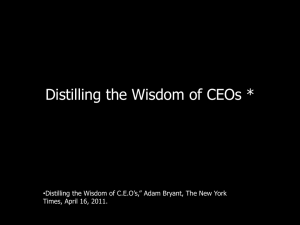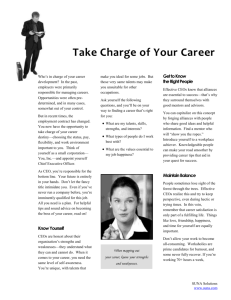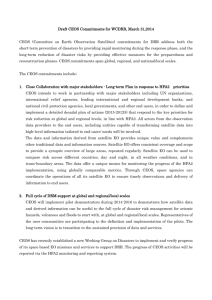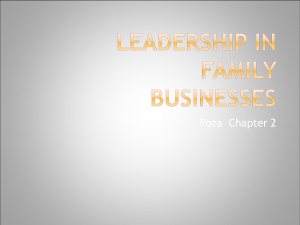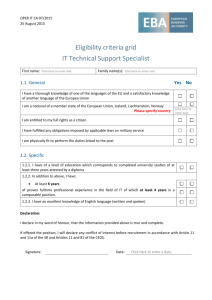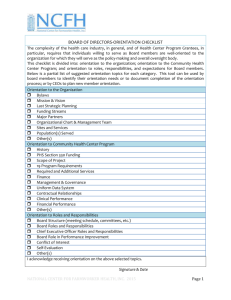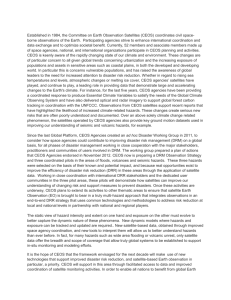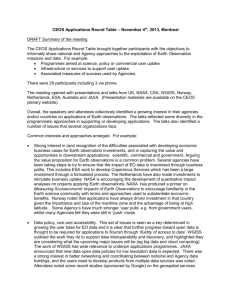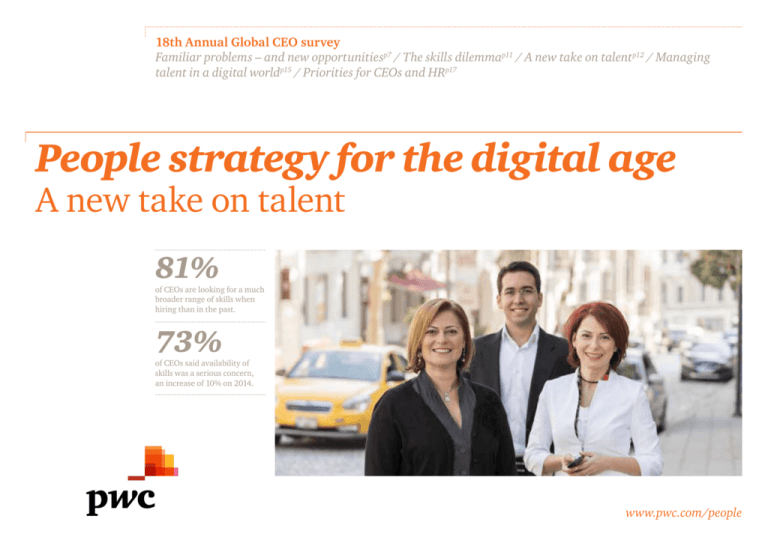
18th Annual Global CEO survey
Familiar problems – and new opportunitiesp7 / The skills dilemmap11 / A new take on talentp12 / Managing
talent in a digital worldp15 / Priorities for CEOs and HRp17
People strategy for the digital age
A new take on talent
81%
of CEOs are looking for a much
broader range of skills when
hiring than in the past.
73%
of CEOs said availability of
skills was a serious concern,
an increase of 10% on 2014.
www.pwc.com/people
PwC’s Global People and Organisation practice brings
together an unmatched combination of 10,000 people
with industry, business, talent, strategy, HR, analytics
and technology expertise in one team across 138 countries
Together, we build tailored people and organisation
solutions with a deep understanding of our clients’
uniqueness and grounded in rigorous analysis and datadriven insight, to create lasting, differentiated value.
We help clients to implement organisational transformation,
improve the effectiveness of their workforce, develop and
move talent around their business, and manage their human
capital risks. We work from people strategy through to
organisational execution.
PwC 18th Annual Global CEO Survey 1
Introduction
Just as the industrial revolution did
a century and a half ago, the digital
revolution is reshaping the way we live
our lives and the way we work; it’s also
forcing a fundamental transformation of
business – changing the relationship with
customers, bringing new entrants and
their disruptive technologies, driving new
channels, products and services, breaking
down the walls between industries and, in
many cases, forcing a basic rethink of the
business model.
The speed of change makes it almost
impossible to predict the future with any
degree of certainty. In such a climate,
organisations need a credible and forwardlooking leader; a role that has never been
more critical. CEOs need to understand
how technology can improve their business
and the customer experience, and plan for
things that seem a distant dream. Denise
Ramos, CEO of ITT Corporation, puts it like
this: “You have to create multiple futures
and multiple options for your company,
because you don’t know when the world’s
going to look like three to five years
from now.”
One of the biggest headaches for CEOs is
making sure that the organisation has the
right people to cope with what lies ahead.
There’s the basic question of planning for
the skills that are needed now and in the
future: Which roles will be automated?
What new roles will be needed to manage
and run emerging technology? What skills
should the company be looking for, and
training their people for? Where will we
find the people we need?
But more importantly, CEOs need to be sure
that the business is fit to react quickly to
whatever the future may throw at it – and
that means filling it with adaptable, creative
people, working in a culture where energy
fizzes and ideas spark into life. If they can’t
be found, they must be created.
Whatever technological innovations are
ahead, it’s the people that will make the
difference between eventual success and
failure. That’s why CEOs need a people
strategy for the digital age.
“Today’s new dynamic
environment requires
original decisions that
have never been
made before.”
Alexey Repik
Chairman of the Board, R-Pharm,
Russia
People strategy for the digital age
Main
findings
A volatile, unpredictable world
Skills at crisis point
73%
78%
CEOs are standing on constantly shifting ground. They see
before them a boiling mix of opportunities and threats,
driven by technology that’s mining new markets but which
is also transforming everything around them, from how
their customers behave to what their people expect from
work. They’re reacting by exploring new business models,
sectors and unexpected partnerships – in a bid to adapt
quickly, find growth, but increasingly to access the skills
they need.
of CEOs said availability
of skills was a concern, an
increase of 10% on 2014.
81%
are looking for a much
broader range of skills
when hiring than in
the past.
The skills shortage has become a crisis-level priority
for CEOs; 73% name it as a threat to their business,
compared with 46% just six years ago. The digital age
has transformed a nagging worry into something far
more challenging; 81% of CEOs say they’re looking for a
wider mix of skills than they have in the past. Businesses
desperately need hi-tech innovators and ‘hybrid’ workers
who understand not only their own sector, but complex
digital technology as well.
say they always use
multiple channels to find
talent, including online
and social.
71%
actively search for talent
in different geographies,
industries, or
demographic segments.
PwC 18th Annual Global CEO Survey 3
A new take on talent
Success in the digital world demands new ways of thinking,
especially when it comes to talent. Workers with the most
in-demand skills are creating a ‘gig economy’, where they’re
in control of where and when they work. Organisations,
in turn, are rethinking their talent mix and exploring the
potential of automation; and CEOs have woken up to the
value of diversity – of thinking and experience – to create
value in the digital age.
33%
have greatly increased
their use of contingent
workers, part-time
employees, outsourcing
and service agreements.
81%
always equip employees
with new skills through
continuous learning or
mobility programmes.
Using data wisely
There’s still some way to go before organisations make
the best possible use of the people data they collect. Under
half of organisations consistently use analytics to provide
insight into how effectively skills are being deployed. CEOs
are fully focused on the role digital technology plays in
engaging customers; so why are they ignoring its value
when it comes to engaging employees?
60%
say creating a skilled and
adaptable workforce
should be a top priority
for government – up 19%
on last year.
75%
believe hiring and
training strategies to
integrate digital
throughout the enterprise
are important.
Great leadership required
Competitive advantage in the digital age lies not in
securing the best technology, but in using and managing
talent well – and that demands truly great leadership. But
this is leadership in a radically transparent world, where
organisations are far more complex, where ideas are a
commodity, and where talent is mobile and autonomous.
Leaders must create a culture where innovation thrives,
ideas spark into life and people – whoever and wherever
they are – are bound together in a common cause.
58%
say that digital
technologies deliver value
in sourcing, developing
and retaining talent.
85%
of CEOs who had a
diversity and
inclusiveness strategy
told us that this had
helped to improve
business performance.
People strategy for the digital age
Familiar
problems
– and new
opportunities
Our 18th Annual Global CEO Survey finds
that the pace of technological, political and
economic change has left CEOs standing on
constantly shifting ground; while 61% feel
that there are more growth opportunities
for their company than there were three
years ago, 59% feel that there
are more threats.
The list of worries for CEOs is long,
spanning everything from overregulation
to the threat of a pandemic, but it’s the risk
that they’ll fail to find the skills and talent
they need to succeed in this new world
that’s fast rising to the top of their list.
CEOs are forging ahead in a world that they
find more volatile and unpredictable. The
theme is one of change, led by disruptive
innovation and the associated shift in
customer preferences, which are driving
fundamental changes to business. CEOs
need to be prepared for anything.
Figure 1: CEOs see more opportunities and
more risks today than three years ago
Q: How much do you agree/disagree that there are
more growth opportunities/threats for your company
than there were three years ago?
31%
see only more
opportunities
30%
see both more
opportunities
and more threats
29%
see only
more threats
61%
see more
opportunities
59%
see more
threats
“There’s no way you can
predict all the changes
that will happen 12
months from now or
three years from now.
Your organisation has
to be ready to react to
any change.”
Victor Kislyi,
Executive Chairman and CEO,
Wargaming Public Company Limited,
Cyprus
73%
of CEOs say the
availability of key
skills is a concern
PwC 18th Annual Global CEO Survey 5
Dealing with digital disruption
The impact of digital technologies is
preoccupying CEOs in every region and
sector. The pace of change is so fast and
the possibilities so far-reaching that there’s
little consensus on where we may end up.
We’ve already seen a ‘smart’ building that
responds to implanted microchips in its
inhabitants,1 and Japanese engineers are
close to completing artificial intelligence
(AI) software that can pass a university
entrance exam.2 What’s next?
So far, CEOs have focused on using
digital technology as a way of enhancing
efficiency, cutting costs and improving the
customer experience. Their willingness to
embrace more radical technology – most
notably robotics and other automation – is
beginning to alter the business landscape.
A central priority for CEOs is the need for
a ‘digital strategy’ to make sure that their
organisations take full advantage of the
opportunities ahead. But what, exactly, do
they mean by a digital strategy?
Figure 2: CEOs see opportunities in a wide range of digital innovations
Q: How strategically important are the following categories of digital technologies for your organisation?
3%
Mobile technologies for customer engagement
Data mining and analysis
3%
Cybersecurity
3%
Internet of Things
5%
Socially enabled business processes
7%
Cloud computing
Battery and power technologies
Robotics
Wearable computing
3D printing
Key
1
2
Not important at all
Not very important
7% 25%
17% 25%
Somewhat important
31%
13% 36%
13%
18%
53%
9% 34%
13% 33%
24%
48%
5% 32%
4%
18%
50%
8% 31%
23% 23%
21% 21%
24% 20%
Very important
http://www.bbc.co.uk/news/technology-31042477
The Todai Robot Project, see http://www.nii.ac.jp/userdata/results/pr_data/NII_Today/60_en/p2-3.pdf
25%
27%
22%
13%
12%
7%
85%
83%
82%
76%
76%
75%
74%
74%
73%
73%
71%
71%
70%
69%
69%
68%
68%
65%
65%
64%
64%
58%
56%
People strategy for the digital age
“Any company, to survive
in the current
environment and into
the future, has to be on
the forefront of
technology. We’re using
robotics in our plants to
be more productive,
effective and efficient,
and to operate our
plants even more safely.”
Alan D Wilson
Chairman, President and CEO,
McCormick & Company, US
51%
will make a strategic
alliance or joint venture
over the next 12 months.
55%
are planning a domestic
or cross-border M&A
over the coming year.
33%
say they have already
entered a new industry.
Planning for automation
The trend towards increased automation
in the workplace has far-reaching
implications for talent management,
from the strategic decision of which
roles can and should be automated to
understanding the consequences for risk
management, performance measurement
and employee engagement.
Perhaps the biggest challenge, though, is
understanding the role that people will play
in an automated world. It’s inevitable that
some tasks that were previously carried out
by people will be replaced by automation.
Robots are already replacing many manual
roles, but more sophisticated technology
and the advent of advanced algorithms
and artificial intelligence advances are
fast bringing the potential to replace
knowledge-based, decision-making roles
as well. But equally, some tasks could only
ever be carried out by software and were
never the domain of humans.
Irrespective of the investment in
automation, though, the real benefits come
from collaboration between people and
technology, rather than from one replacing
the other.
PwC 18th Annual Global CEO Survey 7
Blurred lines
CEOs are reacting to the heady mix of
threats and opportunities by expanding
their options and stepping outside
established borders, exploring new
business models and collaboration with
new partners. Many plan to move their
organisation into new industries, countries
and markets, and they’re not restricting
themselves to what they already know. In
their bid to access new customers and new
technologies, diversification is the name
of the game. This has its own implications
for talent; new business models and
sectors mean that new skills (and most
significantly, combinations of skills) and
ways of working must be found.
At the same time, the traditional
boundaries set around work are also
disappearing. Global and virtual working
continues to alter our understanding of
how and where work is carried out, but
now a newer development has added to
the mix – the rise of ‘workers on demand’.
33% of CEOs said they had greatly
increased their use of contingent workers,
part-time employees, outsourcing and
service agreements. In other words,
‘talent’ no longer means ‘employees’ – and
that has far-reaching consequences for
people management.
“In every area of business today,
partnering and working with other
parties is critical for progress. To avoid
the not-invented-here syndrome, to
embrace different ideas, to benchmark
themselves to each other, and to
improve processes and systems is
critical to the ability of a company to
rejuvenate itself and create a
competitive advantage. We work
together with partners to improve
every single capability that we have.”
Joaquin Duato
Worldwide Chairman, Pharmaceuticals, Johnson &
Johnson, US
33%
said they had greatly
increased their use of
contingent workers, part-time
employees, outsourcing and
service agreements.
26%
say access to talent is a top
reason for collaborating with
other organisations.
56%
Figure 3: Technology and healthcare are the two top industries targeted by companies from other sectors
Q: Which industries has your organisation entered within the past three years or considered entering?
think organisations will
increasingly compete
in new sectors other than their
own over the next three years.
15% 15% 14% 13% 11% 11% 10% 10% 9%
Technology
9%
7%
5%
4%
3%
2%
Healthcare, Professional
Energy, Manufacturing Financial
Retail and
Transport
Comm- Manufacturing Agriculture, Hospitality Construction Government Manufacturing
Pharma and
and
Utilities and – Industrial
Services
Wholesale and Logistics unications, – Consumer
Forestry,
and Leisure
and Public – Automotive
Entertainment products
Life Sciences Business
Mining
products
(including Distribution
Fishing and
Services
Services
Real Estate)
and Media
Hunting
People strategy for the digital age
The skills
dilemma
The fact that CEOs worry about where they
will find the talent and skills they need isn’t
new; but over the past three years the issue
has developed from a nagging worry to a
crisis-level priority.
50% said they expect to increase headcount
this year and just one in five expect to
cut back on staff. CEOs based in the
fastest-growing regions and countries
were far more likely to have plans to
increase headcount: 67% of those in the
ASEAN region, 70% in Mexico and 73%
in India said they planned to expand
their workforce.
CEOs need people but are increasingly
worried about where, and even whether,
they’ll find the types of talented people
they need.
The availability of skills is now the second
biggest concern for business leaders, cited
by 73% of all CEOs and rising to 84% in the
UK, 90% in China and 93% in South Africa
and Japan.
Figure 4: Half of global CEOs are hiring, but they are increasingly worried about getting the skills they need
Q: Do you expect headcount at your company to increase, decrease or stay the same over the next 12 months?
Q: How concerned are you about the following potential economic, policy, social and business threats to your organisation’s growth prospects?
(Availability of key skills was one of the threats CEOs named.)
73%
63%
61%
56%
51%
46%
51%
58%
53%
51%
50%
50%
2014
2015
45%
37%
2008
2009
39%
2010
2011
Worried
about key
skills
2012
2013
Planning
to increase
headcount
PwC 18th Annual Global CEO Survey 9
Q: How concerned are you about the following potential economic, policy, social and business threats to your organisation’s growth prospects? (Availability of key skills
was one of the threats CEOs named.)
50%
93% Japan
85% Metals
93% South Africa
83% Technology
said they plan to
increase headcount
this year.
90% China
82% Healthcare
85% Hong Kong
76% Automotive
84% Romania
76% Forest, Paper and Packaging
84% UK
75% Business Services
79% Argentina
74% Industrial Manufacturing
78% ASEAN
74% Transport and Logistics
78% US
73% Global
78% Russia
73% Entertainment and Media
77% CEE
71% Banking and Capital Markets
76% Middle East
71% Insurance
74% Australia
70% Power and Utilities
73% Global
69% Engineering and Construction
“To be able to attract
people with multiple
talents is an absolute key
in the whole digital
economy, and is also
probably our largest
single headache. We need
multi-talented people
who not only understand
one piece of technology
or one piece of
commercialisation but
rather the whole chain.”
70% India
69% Consumer
Pekka Lundmark
68% Brazil
68% Chemicals
President and CEO, Konecranes Plc,
Finland
67% Switzerland
68% Asset Management
63% Denmark
65% Communications
62% Nordics
65% Hospitality and Leisure
61% Mexico
64% Pharma and Life Sciences
61% Canada
64% Energy
54% Germany
58% Retail
53% Spain
56% Mining
Figure 5: CEOs are worried about finding the skills they need – but not all to the same extent
49% Italy
37% France
People strategy for the digital age
Organisations are committing a lot of energy
to the search for talent and to find the people
they need. They are searching in many
more places: 78% of CEOs say their business
always uses multiple channels to recruit,
while 71% say they actively search for talent
in different geographies, industries and
demographic segments. But why is finding
the right people proving so difficult?
One reason is that the blurred lines
between sectors and the willingness of
organisations to collaborate with partners
outside of their comfort zone, particularly
hi-tech innovators, is creating a need
for ‘hybrid’ workers who understand not
only their own sector, but complex digital
technology as well.
81%
78%
said they are
looking for a much
broader range of skills when
hiring than they have in
the past.
said their
business always
uses multiple channels
to recruit.
Figure 6: Eight in 10 CEOs equip employees with new skills through continuous learning and look for a much broader range of skills than in the past
Q: To what extent do you agree or disagree with the following statements about your organisation’s talent activities?
50%
48%
We always equip employees with new skills through continuous
learning programmes
4% 56%
We look for a much broader range of skills when hiring than
we did in the past
1%
We always use multiple channels to find talent, including online
platforms and social networks
25%
27%
1%
We actively search for talent in different geographies, industries
and/or demographic segments
2%
We always use data analytics to provide better insight into how
effectively skills are being deployed within our organisation
3%
We always collaborate with a wide range of external organisations to
fulfil talent needs, including sharing of talent with other organisations
We have greatly increased our reliance on contractors, part-time
workers, outsourced functions or service agreements
Key
Disagree strongly
Disagree
Agree
5% 58%
23%
7% 52%
26%
9% 48%
23%
19% 38%
8%
25% 32%
4%
28% 26%
9%
Agree strongly
25%
9%
8%
7%
14%
14% 67%
10%
17% 66%
13%
17% 64%
13%
10% 63%
10%
18% 62%
11%
18% 62%
11%
26%
57%
10%
Agree
PwC 18th Annual Global CEO Survey 11
71%
say they
actively search
for talent in different
geographies, industries or
demographic segments.
81% of CEOs confirm that they are
looking for a much broader range of skills
when hiring than they have in the past.
Unsurprisingly, tech skills are in high
demand, with three-quarters of business
leaders believing that specific hiring and
training strategies to integrate digital
technologies throughout the organisation
are essential for success in the digital age.
CEOs know they need to concentrate on
their organisation’s ability to learn, adapt
and innovate. Really understanding the
type of skills that they’ll need, the type of
people they’ll need, and the channels they’ll
use to find them, create a set of complex
challenges.
People strategy for the digital age
A new take
on talent
Digital technology is taking over the
workplace and we’re seeing entire sectors
digitizing their business models, but that
hasn’t made people less important; it’s
made having the right people absolutely
essential. That doesn’t just mean people
with digital skills – although clearly that’s
important – but a collection of people who
think innovatively, can adapt instantly,
who give the company a competitive edge.
It also means managing people well and as
technology develops, creating the right mix
of automation and human creativity.
The organisations that have hit the heights
of success in the digital world aren’t
those that have determinedly followed
the old models and ways of thinking; it’s
those that have forged a new path. These
organisations have a people strategy that
delivers vital skill sets, new mindsets,
and better collaboration – across lines
of business and geographies – all in a
much more transparent and data driven
environment. They embrace tech-savvy
strategy, create a culture where innovation
thrives, understand the value of true
diversity in conceiving new ideas, and
rethink their investment in people.
What companies need isn’t just a digital
strategy; it’s a people strategy for the
digital age.
3
Creating an adaptable workforce
Economies and organisations survive by
continually responding to the world around
them. In our work with LinkedIn,3 we
examined the role played by adaptability, or
the human element of a flexible workforce.
This is the ability of employers to think
more widely about sources of talent,
exploring not only new geographies and
sectors, but investing in their current
employees and encouraging them to
try new things – and the willingness of
employees to embrace change and apply
their skills somewhere new.
We believe that an adaptable workforce
is essential in the digital world as a
way of addressing the skills gap and by
creating a better match between employer
and employee.
81% of CEOs say that their business is
constantly looking to equip employees with
new skills through continuous learning or
mobility programmes, although there are
some geographical variations: only 61%
of CEOs in Japan agreed, compared with
86% in Africa and 87% in the Middle East.
Business leaders need to go one step further
and encourage a wide range of abilities and
experiences, and create workers who are
willing and able to apply their skills to new
opportunities as they arise.
Adapt to survive, see http://www.pwc.com/gx/en/hr-management-services/publications/talent-adaptability/index.jhtml
“We are actively finding
ways of rotating people
between Asian countries
and the Nordic market.
We are highly mindful
that it is very
important, also for
the development of the
company, that we have
such cultural diversity
and rotation taking
place. In that sense
the value of diversity
somewhat overrides
the additional cost.”
Kimmo Alkio
President and CEO, Tieto, Finland
81%
of CEOs say
that their business
is constantly looking to equip
employees with new skills
through continuous learning
or mobility programmes.
PwC 18th Annual Global CEO Survey 13
Talent on tap
This year’s survey shows clearly how the
organisation of labour is changing as
businesses seek to become more responsive
and agile, shedding and gaining workers
as they need them. A third of CEOs
say they have greatly increased their
reliance on contractors, part-time workers
and outsource arrangements. This is
particularly the case in Africa (49%), where
CEOs say that the skills shortage is acute.
These contingent workers are often highly
skilled or motivated and, as a result, central
to the success of the organisation. They
are driving a ‘gig economy’, where those
with the most in-demand skills can dictate
where and when they work, and who they
work for. Organisations must compete for
their attention, but also manage them as
carefully and strategically as full-time
employees; the ‘workforce’ no longer
means only direct employees and this
has wide-ranging implications for talent
management. For instance, how should
the performance of contingent workers be
measured? And rewarded?
The diversity dividend
In recent years the skills shortage in many
countries has encouraged organisations to mine
for talent in previously underused demographic
groups or cross-border talent, but CEOs are now
recognising that the benefits to diversity go far
beyond talent supply.
The ‘traditional’ understanding of workplace
diversity as meaning gender, age and ethnic
diversity has moved on. In the fast-paced
digital world, innovative thinking drives
competitive advantage and CEOs know that
they must create an environment where
innovation can thrive. The fire of innovation,
adaptability and creativity is fuelled by
diversity, when people with a wide range of
perspectives work together; not just people
of different ages and gender, but people who
are different across every dimension – with
different backgrounds, physical characteristics,
life experiences and personalities.
Figure 7: Gender and knowledge, skills and experience are the most common
dimensions addressed in CEOs’ diversity and inclusiveness strategies
Q: Which dimensions of talent diversity and inclusiveness do you specifically address, or
plan to address in your company’s talent strategy?
33%
Gender
0.8%
Adaptability
32.4%
Knowledge,
skills and
experience
1.2%
Religion/
creed
24.5%
Ethnicity/
nationality/
race
4.7%
Personal
quality/
mindsets
7.2%
8.2%
Disability
8%
Age
Attitude to
career/progression
People strategy for the digital age
“If you look at the
connection between
diversity and the
bottom line, it’s quite
obvious that if you have
a diverse team, if you
really reflect the
markets and the world
you are actually a part
of, then you will be
much better positioned
to capture new trends.”
Olof Persson
President and CEO,
The Volvo Group, Sweden
“We want people in the
company that have
differing ideas, differing
experiences, differing
opinions, because we
need to solve our
customers’ problems.
The only way you do that
in a world class way is to
bring a variety of people
together and use their
collective know how.
Diversity and inclusion
will make us that much
more competitive in the
marketplace.”
Denise Ramos
Chief Executive Officer and President,
ITT Corporation, US
90% 85%
of CEOs who
had a diversity
strategy told us that this had
helped them attract talent.
said their
diversity strategy
helped them improve
business performance.
CEOs are embracing the need for diverse
thinking, but are still struggling to find the
best way to attract and keep the range of
perspectives they’re looking for. Formal
strategies can help to broaden the mix of
talent; 90% of CEOs who had a diversity
strategy told us that this had helped them
attract talent and 85% said it had helped
to improve business performance. They
also saw it as benefiting innovation,
collaboration, customer satisfaction and
their ability to harness new technologies
– all essential ingredients for success in
today’s world.
But there’s still a lot of work to be
done. Three in ten CEOs say that their
organisation doesn’t have a strategy to
promote diversity and inclusiveness,
although 13% said they had plans to
adopt one. There were wide geographical
differences: just 23% of CEOs in Hong
Kong and 32% of those in Romania had
a diversity strategy, compared with 86%
in Australia.
PwC 18th Annual Global CEO Survey 15
Figure 8: CEOs’ commitment to a formal diversity policy varies dramatically
Q: Does your organisation have a strategy to promote talent diversity and inclusiveness or have plans to adopt one?
50%
48%
7%
Australia
Denmark
3%
India
1%
Brazil
25%
27%
2%
France
3%
US
9%
Switzerland
10%
5%
Mexico
Global
7%
South Africa
17%
6%
Spain
9%
Italy
7%
UK
2%
Nordics
Japan
13%
Middle East
Communications
Pharma and Life Sciences
8%
16% 64%
7%
17% 64%
13%
17% 63%
15%
20% 63%
13%
22% 63%
11%
14%
Global
6% 74%
17%
Banking and Capital Markets
7%
Technology
7% 70%
14%
14% 67%
10%
17% 66%
13%
17% 64%
13%
10% 63%
10%
18% 62%
11%
18% 62%
11%
10%
20% 55%
17%
14%
18% 60%
12%
24% 60%
8%
18%
18% 58%
Chemicals
Consumer
7%
19% 56%
18%
10%
Energy including Oil and Gas
Healthcare
16%
Entertainment and Media
12%
Hospitality and Leisure
11%
Retail
18%
21% 48%
8398
92
92
98
4
.4195
28
.80
288
49
2
.19
480
69
7
.48
573
89
1
.7766
09
5
.16
869
29
.45
952
49
4
.74
145
79
8
.03
248
90
2
.33
4310
7
.72
524
31
.072
157.3
0
51
0
80
70
.600.0
10%
22% 61%
17%
22%
No, we don’t have a strategy nor do we plan to adopt one
20% 62%
13% 57%
19% 50%
Don’t know/refused
12%
14%
24% 50%
Key
5%
Industrial Manf.
18% 53%
28%
11%
8%
Mining
25% 53%
49% 23%
3%
Automotive
Transport and Logistics
14%
9%
Engineering and Construction
12%
14%
19%
4%
4%
Business Services
30% 54%
27% 32%
6%
Power and Utilities
14%
Hong Kong
6%
9% 75%
20%
22%
10%
12% 73%
8%
8%
China
Romania
6%
15% 74%
8% 82%
Argentina
Russia
5%
Insurance
8% 83%
26% 57%
8%
ASEAN
5%
16% 74%
4%
Germany
2% 86%
6%
10%
6%
22%
9%
10%
Forest, Paper and Packaging
Asset Management
Metals
Yes, we have such a strategy
11%
5%
24% 56%
11%
23% 55%
16%
15%
21% 54%
20%
21% 53%
27% 53%
6%
22% 52%
17%
14%
25% 51%
16%
26% 47%
44% 41%
10%
No, we don’t have such a strategy –but we plan to adopt one
33.928549
40.714259
47.499969
54.285679
61.071389
67.857099
74.642808
81.428518
88.214228
94.999938
8398
92
92
98
4
.4195
28
.80
288
49
2
.19
480
69
7
.48
573
89
1
.7766
09
5
.16
869
29
.45
952
49
4
.74
145
79
8
.03
248
90
2
.33
4317
.7523.02
33.928549
40.714259
47.499969
54.285679
61.071389
67.857099
74.642808
81.428518
88.214228
94.999938
People strategy for the digital age
22%
felt that their own
government had been
effective in collaborating
to create a skilled and
adaptable workforce.
Building skills from the bottom up
As their fears about finding the right talent
in the future increase, CEOs are investing
more effort into creating skills in the next
generation of workers and recognise that
this needs to be a collaborative effort. 60%
(a 19 percentage point increase on last year)
felt that creating a skilled and adaptable
workforce should be in their government’s
top three priorities, but only 22% felt that
their own government had been effective in
this area. CEOs based in Latin America and
Africa are particularly disillusioned, with
65% and 80%, respectively, saying that
their government had been ineffective in
creating a skilled workforce.
Overall, 44% of CEOs say that their
organisation will work with governments to
develop a skilled and adaptable workforce
over the next three years.
PwC 18th Annual Global CEO Survey 17
In practice, though, collaboration between
business and government is patchy. CEOs
in Denmark (70%), France (74%), Brazil
(68%) and India (66%) were more likely to
work with government, often an indication
of a specific state programme. In Denmark,4
for example, the newly elected coalition
government announced in 2012 a number
of initiatives aimed at tackling rising
unemployment among the 25-to 30-yearold age group, which included a statefunded adult apprenticeship programme
and in-company vocational training.
“Great products and
solutions come when
there is a synthesis of lots
of different kinds of
perspectives, and when
we are diverse we create
the opportunity for that
rich synthesis of great
perspectives. The more
diverse we are, the better
we will all be. This is
more than something
that you pay lip service
to; this is one of the
fundamental priorities
for us at Infosys.”
Dr Vishal Sikka
Chief Executive Officer and
Managing Director, Infosys, India
http://www.cedefop.europa.eu/en/news-and-press/news/denmark-government-combat-youth-unemployment-education
4
People strategy for the digital age
Managing
talent in a
digital world
By the numbers: Data analytics
One thing we’re not suffering from in
the digital world is a lack of data – it’s
everywhere.
Four out of five (80%) CEOs told us that
the use of data analytics was critical to
a successful digital strategy. The use of
analytics, though, seems to be focused on
external stakeholders and is yet to be used
to its full effect when it comes to talent
management. Under half of CEOs (46%)
told us that their organisation always
uses analytics to provide insight into how
effectively skills are being deployed. Just
58% felt that digital investment had created
value for their organisation in terms of talent
strategy by helping them to find, develop and
retain talent.
CEOs are fully focused on the role digital
technology plays in engaging customers; so
why are they ignoring its value when it comes
to engaging employees? The abundance
of information – from both internal and
external sources – is the richest possible
mine when it comes to understanding the
employer brand, employee engagement
and what employees want and need from
the organisation. The vital, and apparently
missing, step is to transform the data
collected into strategic advantage.
Figure 9: CEOs are failing to gain full value from people analytics
80%
of CEOs see data
analytics as strategically
important to their
business...
“The data is great, but
how you use it as
leaders is the most
important thing.”
Dr. Marc Harrison
Chief Executive Officer, Cleveland
Clinic Abu Dhabi, UAE
“We’ve been much more
proactive in identifying
capabilities and skills
that we think our top
leaders will need to
compete in the new
world. We spend an
enormous amount of
time as a team talking
about people’s skill sets,
how they have to evolve
and what are the best
roles for them to take
on. And we tap people
on the shoulder and say,
it’s time to move on.”
David I McKay
President and Chief Executive
Officer of RBC, Canada
46%
...but only 46% of
CEOs use data
analytics to provide
insight into how
effectively skills are
deployed in their
organisation
PwC 18th Annual Global CEO Survey 19
Getting leadership right
Leaders are presiding over organisations that
are becoming more complex: where crossborder and cross-sector collaboration is the
norm, where workers are mobile, working at
home or self-employed on a short contract,
where ideas are a commodity and innovation
the competitive differential. They’re also
operating in a radically transparent world
where very little is secret. Driving forward
an organisation that, on paper, seems one
step away from anarchy, depends entirely
on the skills and energy of its leaders and
on a culture that binds people together and
motivates them in a common cause.
The digital world requires a different form of
leadership and management. The winning
leadership capabilities of the future will
include some of the traditional leadership
traits of vision, courage and humility, but
increasingly an ability to drive a sense
of purpose, build trust with internal and
external stakeholders, adapt to change at
warp speed, anticipate fierce competitors,
and deal with significant and evolving risks.
We have consistently said that the digital
world demands extraordinary leadership.
Organisations need to be sure that they can
create a solid pipeline of future leaders, who
are well-prepared to take on the challenges
of the digital age with the skills to manage a
complex organisation.
How will these leaders be made? We’d
argue that wide experience – a measure
of adaptable leaders – is becoming more
important than ever. Of the CEOs questioned
for the survey, 29% have no experience in
any sector beyond their own. Given the trend
towards cross-sector collaboration and techbased alliances, it’s more important than
ever that business leaders understand the
possibilities of technology.
Reinventing HR?
While organisations are adapting quickly
to the changing world, it’s essential that
HR matches the pace. Previous surveys
have indicated that CEOs don’t always
have confidence that their HR function is
well-equipped to handle the challenges of
competing for talent.5
While many improvements have been
made, there’s a risk that too many HR
functions are overwhelmed by the scale
of changes needed to address a highly
competitive talent market, a shifting talent
model where employees and contract
workers sit side by side, and a workforce
that expects the same level of individuality
that they receive as consumers.
The old systems and HR approaches no
longer apply; a creative reinvention of the
role of HR is long overdue.
Our 17th Annual Global CEO Survey, for example, found that only 34% of CEOs felt their HR function was equipped
to cope with transformational change
5
People strategy for the digital age
Priorities
for CEOs
and HR
PwC 18th Annual Global CEO Survey 21
Rethinking people strategy
As business strategies undergo
a fundamental re-think, so must
organisations’ people strategies.
A wholesale re-design of work is now
required to deal with the opportunities
and threats of new technology and digital
business models, to meet regulatory
requirements or cost targets.
Find the right leaders
Leaders need to be able to create a culture
that encourages and rewards innovation
and sets ideas free. But there are also
new leadership skills to master – the
ability to understand and guide complex
organisations that straddle geographic and
sector boundaries, and the ability to build
and maintain trust in a world where very
little is hidden. Organisations must not only
find great leaders for today, but encourage
a pipeline of adaptable leaders for the
unknown challenges that will come.
Adapt to changing demand
In the current climate, some of the most
critical strategic decisions to be made will
be around people and skills. What are the
capabilities you need to compete? Can
those skills be hired, or existing employees
trained? What needs to be automated?
Or outsourced? And would a partnership
bring you the talent you need? Training
and development is absolutely essential
in a market where demand changes so
rapidly. The development of analytical and
digital skills is paramount, but so too is
encouraging adaptability throughout the
organisation. You don’t necessarily know
which skills you’ll need in the future, so
creating a flexible workforce willing to
adapt to new challenges is essential.
Embrace diversity
Success in an increasingly digital world
demands a wider range of skills, a broader
talent pool and new ways of thinking. It’s
important for CEOs and their HR teams to
take a more active role in seeking out fresh
sources of talent, encouraging divergent
thinking and broadening the criteria for
succession planning. There will always
be an element of ‘doing the right thing’
around diversity – and that shouldn’t be
undervalued – but CEOs increasingly see
improved business performance from their
diversity programmes.
Know, and value, your people
It’s easy to lose sight of the value of people
in a digital world. The real winners won’t
necessarily be the organisations that secure
the best and latest technology; it’ll be those
that use the technology they have to get the
best out of their people – and vice versa.
And that means using talent data wisely.
We have access to more data than ever,
but information means nothing unless it’s
intelligently analysed and the results fed
into talent strategy.
Create value through HR
CEOs can’t and shouldn’t be expected to
do all this alone. A strong and dynamic HR
function, fit for the digital age, is required
to deal with the almost overwhelming
challenges presented by the radical
disruption sweeping through entire
industries. CEOs, in turn, need to value
the best that HR can bring and empower
HR leaders to evolve the function to match
today’s – and tomorrow’s – business needs.
Conclusion
PwC 18th Annual Global CEO Survey 23
Digital innovation has changed
the rules around talent and talent
management. CEOs are fully aware
of the complex challenges they
face in the digital age and correctly
identify that talent will be one of
the biggest differentiating factors
for their organisation’s success.
But the talent needed for the
digital age – adaptable, flexible
people with compound skills and
a willingness not just to embrace
change, but to drive it forward –
is far more complex than before
and this is placing even greater
responsibility on organisations
to create the talent they need.
Ironically, as the workplace
becomes increasingly digital,
people matter more than ever.
Workforce planning and
management have become highly
strategic; the skills needed are
constantly evolving, talent supply
is erratic and contingent workers
are becoming a critical resource.
CEOs need an HR function
that’s at the top of its game –
innovative, analytical, predictive
and supportive.
This is a time for bold decisions;
a ‘business as usual’ people strategy
won’t serve any organisation well.
We’ve already seen that those
leading the way in the digital world
are companies that are rewriting
the rulebook, nowhere more so
than in the way they find, manage,
organise and reward their people.
People strategy for the digital age
About the
survey
In total, we conducted 1,322 interviews
with CEOs in 77 countries between
September and December 2014. By region,
459 interviews were conducted in AsiaPacific, 330 in Western Europe, 147 in
North America, 167 in Latin America,
125 in Central & Eastern Europe and
94 in Africa and the Middle East, in line
with GDP.
In addition, 33 CEOs sat down with us
near the end of 2014 for more extensive
conversations. Their thoughts are reflected
in the quotes throughout our report. The
interviews were spread across a range of
industries.
More details about our survey methodology
and findings by region and industry can be
found at www.pwc.com/ceosurvey
Western
Europe
North
America
330 interviews
(25%)
147 interviews
(11%)
Middle
East and
Africa
Latin
America
167 interviews
(13%)
94 interviews
(7%)
1,322
77
interviews completed across
countries
Central
& Eastern
Europe
125 interviews
(9%)
AsiaPacific
459 interviews
(35%)
PwC 18th Annual Global CEO Survey Contacts
Jon Andrews
Joint Global Leader,
People and Organisation
+44 20 7804 9000
jon.andrews@uk.pwc.com
Jon Williams
Joint Global Leader,
People and Organisation
+61 (2) 8266 2402
jon.williams@au.pwc.com
Justine Brown
Head of Marketing,
Global People and Organisation
+44 113 289 4423
justine.brown@uk.pwc.com
25
North America
Jeffrey W. Hesse
+1 312 298 6881
jeffrey.w.hesse@us.pwc.com
Central & Eastern Europe
Alla Romanchuk
+7 (495) 232 5623
alla.romanchuk@ru.pwc.com
Australia
Jon Williams
+61 (2) 8266 2402
jon.williams@au.pwc.com
Scott Olsen
+1 646 471 0651
scott.n.olsen@us.pwc.com
Middle East
David Suarez
+971 4304 3981
david.suarez@ae.pwc.com
South and Central America
Joao Lins
+55 11 3674 3536
joao.lins@br.pwc.com
China/Hong Kong
Mandy Kwok
+852 2289 3900
mandy.kwok@hk.pwc.com
Africa
Gerald Seegers
+27 (11) 797 4560
gerald.seegers@za.pwc.com
Bhushan Sethi
+1 646 471 2377
bhushan.sethi@us.pwc.com
Western Europe
Jon Andrews
+44 20 7804 9000
jon.andrews@uk.pwc.com
Joan Daura Cros
+34 932 532 758
joan.daura.cros@es.pwc.com
Peter De Bley
+32 2 7104321
peter.de.bley@be.pwc.com
Charles Donkor
+41 58 792 4554
charles.donkor@ch.pwc.com
Till Lohman
+49 40 6378-8835
till.r.lohmann@de.pwc.com
Roger Ng
+86 (10) 6533 7018
roger.ng@cn.pwc.com
Singapore
Alywin Teh
+65 62367268
alywin.teh@sg.pwc.com
India
Padmaja Alaganandan
+91 80 4079 4001
padmaja.alaganandan@in.pwc.com
www.pwc.com/people
PwC helps organisations and individuals create the value they’re looking for. We’re a network of firms in 157 countries with more than 195,000 people who are committed to delivering quality in assurance, tax and advisory services. Find out more and tell us what matters to you by
visiting us at www.pwc.com.
This publication has been prepared for general guidance on matters of interest only, and does not constitute professional advice. You should not act upon the information contained in this publication without obtaining specific professional advice. No representation or warranty
(express or implied) is given as to the accuracy or completeness of the information contained in this publication, and, to the extent permitted by law, PwC does not accept or assume any liability, responsibility or duty of care for any consequences of you or anyone else acting, or
refraining to act, in reliance on the information contained in this publication or for any decision based on it.
© 2015 PwC. All rights reserved. PwC refers to the PwC network and/or one or more of its member firms, each of which is a separate legal entity. Please see www.pwc.com/structure for further details.
Design Services 29077 (05/15).

